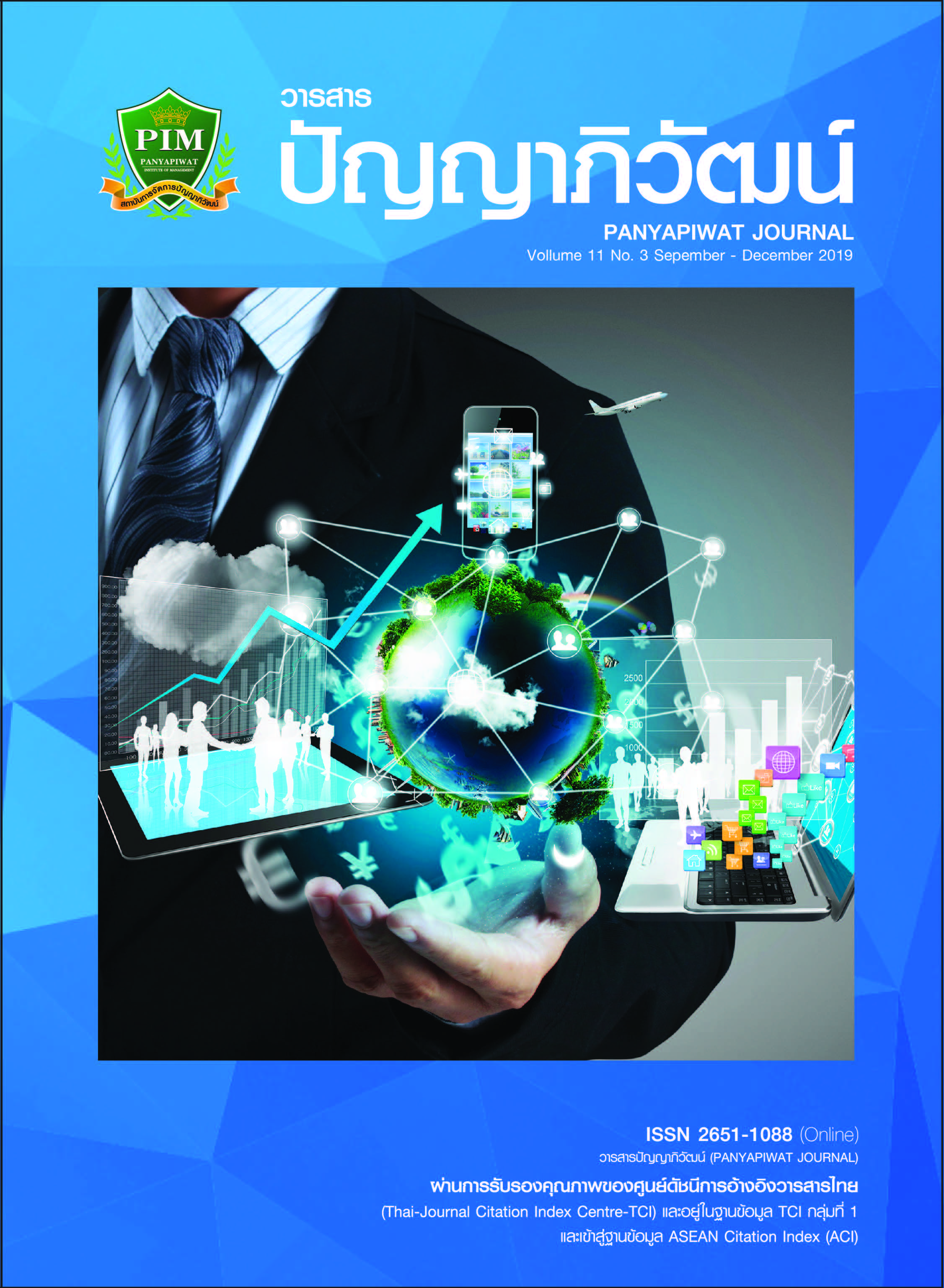การพัฒนาศักยภาพผู้นำชุมชนแบบไม่เป็นทางการในตำบลหนองผึ้ง ตำบลยางเนิ้ง และตำบลสารภี จังหวัดเชียงใหม่ ด้วยกระบวนการมีส่วนร่วมของชุมชน
Main Article Content
บทคัดย่อ
งานวิจัยนี้มีวัตถุประสงค์เพื่อศึกษาสภาพบริบท คุณลักษณะ และภาวะผู้นำของผู้นำชุมชนแบบไม่เป็น ทางการ ความต้องการจำเป็นในการพัฒนาศักยภาพผู้นำฯ ดำเนินการพัฒนาศักยภาพผู้นำฯ และการประเมินและติดตามผลการดำเนินการพัฒนาศักยภาพผู้นำฯ กลุ่มตัวอย่าง ได้แก่ กลุ่มเครือข่ายเชียงใหม่เขียวสวยหอม กลุ่มเครือข่ายด้านวิสาหกิจชุมชนด้านเกษตรชุมชน ด้านการท่องเที่ยว และกลุ่มอาสาสมัครยางนา รวมจำนวน 80 คน เครื่องมือที่ใช้ในการวิจัย ได้แก่ การสัมภาษณ์ การสังเกต การสนทนากลุ่ม การจัดเวทีชุมชน การอบรมเชิงปฏิบัติการการประชุมระดมสมอง และแบบประเมินฯ วิเคราะห์ข้อมูลโดยใช้การวิเคราะห์เนื้อหา ความถี่ ค่าเฉลี่ย ผลการวิจัยพบว่า สภาพบริบทของพื้นที่เป็นสังคมกึ่งเมืองกึ่งชนบทและผู้นำชุมชนแบบไม่เป็นทางการ ส่วนใหญ่จะเป็นผู้สูงอายุ มีความต้องการพัฒนาเกี่ยวกับภาวะผู้นำการเปลี่ยนแปลงและการรณรงค์ด้านจิตสาธารณะ ซึ่งผลการดำเนินการพบว่า จากกลุ่มตัวอย่าง จำนวน 80 คน มีผู้ยื่นใบสมัครเข้ารับการพัฒนา จำนวน 53 คน และจากการประเมินและติดตามผลการดำเนินการพบว่า ผู้นำชุมชนแบบไม่เป็นทางการมีการพัฒนาตนเองในด้านภาวะผู้นำ การทำงานเป็นทีม การจัดการยางนาเชิงบูรณาการด้านสิ่งแวดล้อมกับการท่องเที่ยวชุมชน และเกิดพลังในการขับเคลื่อนชุมชนผ่านการปฏิบัติหน้าที่เป็นวิทยากรของชุมชน เป็นแกนนำเครือข่ายเขียวสวยหอม กลุ่มอาสาสมัครยางนา และกลุ่มแกนนำจิตอาสา
Article Details
“ข้าพเจ้าและผู้เขียนร่วม (ถ้ามี) ขอรับรองว่า บทความที่เสนอมานี้ยังไม่เคยได้รับการตีพิมพ์และไม่ได้อยู่ระหว่างกระบวนการพิจารณาลงตีพิมพ์ในวารสารหรือแหล่งเผยแพร่อื่นใด ข้าพเจ้าและผู้เขียนร่วมยอมรับหลักเกณฑ์การพิจารณาต้นฉบับ ทั้งยินยอมให้กองบรรณาธิการมีสิทธิ์พิจารณาและตรวจแก้ต้นฉบับได้ตามที่เห็นสมควร พร้อมนี้ขอมอบลิขสิทธิ์บทความที่ได้รับการตีพิมพ์ให้แก่สถาบันการจัดการปัญญาภิวัฒน์หากมีการฟ้องร้องเรื่องการละเมิดลิขสิทธิ์เกี่ยวกับภาพ กราฟ ข้อความส่วนใดส่วนหนึ่งและ/หรือข้อคิดเห็นที่ปรากฏในบทความข้าพเจ้าและผู้เขียนร่วมยินยอมรับผิดชอบแต่เพียงฝ่ายเดียว”
เอกสารอ้างอิง
Boonyarithanon, N. & Raungdessuwon, S. (2016). Development of system and mechanism on research management of private university accommodating to Area-based Collaborative Research (for developing rural-urbanization): The Far Eastern University and The Community Development Research for Sarapee sub-district. Area Based Development
Research Journal, 8(2), 76-99. [in Thai]
Buddhakosa, K. (2012). The Completed Manual of the Learning Community Development. Retrieved March 10, 2016, from https://www1.nrct.go.th/downloads/sci_adviser/ manual_develop_community.pdf. [in Thai]
Chaikaew, P. (2017, May 3 and July 12). Interview. Community Leaders. Chiang Mai Province. [in Thai]
Chantarasombat, C. (2009). Developing a Madel of Learning from Learner-Centered Action. Administration & Development Journal, 1(3), 89-121. [in Thai]
Chemnasiri, N. (2013). Community Potential Development for Sustainable Agro- tourism : Cases in Phuket and Chonburi, Thailand. Chandrakasem Rajabhat University Journal, 19(36), 41-50. [in Thai]
Department of Local Administration, Ministry of Interior. (2017). Population and Household Statistic Report. Retreived March 10, 2018, from https://stat.dopa.go.th/stat/statnew/ statTDD/views/showDistrictData.php?rcode=50&statType=1&year=61 [in Thai]
Hawanoon, N., Chiradachakul, P. & Patthaisong, S. (2007). Community Strengthening Index, The Harmony Between Grounded Theory and Empirical Evidence. Bangkok: The Thailand Research Fund (TRF). [in Thai]
Huatchareon, N. (2017, May 3 and July 12). Interview. Community Leaders. Chiang Mai Province. [in Thai]
Kanchanadham, P. (2013). Administrators’ Transformational Leadership in Laokhwan District The Office of Kanchanaburi Primary Educational Service Area 4. Master’s thesis in Educational Administration, Mahachulalongkornrajavidyalaya University. [in Thai]
Onlamai, W. (1996). Unit 8 Public Mind. (handout). Yasothorn: Yasothorn College of Agriculture and Technology. [in Thai]
Pongsriwat, S. (2011). Leadership: Theory and Practice. Chiang Rai: Chiang Rai Rajabhat University. [in Thai]
Tewiya S, Chaisorn, S., Boonloong, W. & Samuthai, R. (2016). Public-mindedness of Chiang Rai Rajabhat University’s Teacher Education Students Learning Through Service Learning Activities. Journal of Graduate Studies in Northern Rajabhat Universities, 6(11), 81-96. [in Thai]
Yangyuen, A. ( 2017, May 3 and July 12). Interview. Community Leaders. Chiang Mai Province. [in Thai]


